About Me
Dr. Adil Hassan is a specialist doctor passionate about improving outcomes and quality of life for people facing cancer care challenges. His journey in medicine began in Bangalore, India, in 2006. Over the next 14 years, he has cultivated expertise in diagnosing and treating various types of cancer in collaboration with surgical oncology and radiation oncology experts. As a medical oncologist, his areas of special focus include chemotherapy, hormonal therapy, biological therapy, and targeted therapy. Priority is patient comfort and well-being, ensuring they receive the most effective treatment with minimal side effects, and supporting individuals not only medically but also emotionally and socially throughout their cancer treatment.
Each patient’s journey is unique, and treatment plans are tailored to meet their individual needs and preferences, emphasizing clear communication and empathy. In addition to professional endeavors, he is deeply committed to community outreach programs that raise awareness, encourage early detection, and prevent cancer.
- Email: adilhassan55@gmail.com
- Phone: +91-9127750457
- Appointment:
12 years of experience overall post MBBS, and 7 years in field of Oncology
My Academia
MBBS
M D (Internal Medicine)
D M (Medical Oncology)
Dr N B (Medical Oncology)
My Experience
Junior Resident, Department of Internal Medicine
Registrar, Department of Cardiology
Senior Resident, Department of Medical Oncology
Associate Consultant, Department of Medical Oncology
Consultant, Medical Oncology
My Specialisations
Chemotherapy
Chemotherapy is a type of cancer treatment that uses drugs to kill cancer cells or stop them from growing. The drugs can work by interfering with the cancer cells' ability to divide and grow.
There are several ways chemotherapy can be administered:
- Intravenous (IV): Directly into a vein.
- Oral: In the form of pills or capsules.
Palliative Therapy in Advanced Tumours
Palliative therapy, also known as palliative care, focuses on improving the quality of life for patients with serious illnesses, rather than trying to cure the illness. It aims to alleviate symptoms, pain, and stress related to the illness, and to support the emotional, social, and spiritual needs of both the patient and their family.
Key aspects of palliative therapy include:
- Symptom Management
- Emotional and Psychological Support
- Communication and Decision-Making
- Coordination of Care
- Support for Families
Targeted Therapy
Targeted therapy is a type of cancer treatment that specifically targets the molecular and genetic changes associated with cancer cells, rather than affecting all rapidly dividing cells like traditional chemotherapy. This approach aims to disrupt cancer cell growth and survival more precisely, potentially leading to fewer side effects and greater effectiveness.
Monoclonal Antibodies: These are lab-made molecules that can specifically bind to cancer cell antigens (proteins on the surface of the cells). For example, trastuzumab (Herceptin) targets HER2-positive breast cancer cells.
Small Molecule Inhibitors: These drugs are typically taken orally and work inside cells to block the activity of specific proteins that promote cancer growth. Examples include imatinib (Gleevec) for chronic myeloid leukemia and gefitinib (Iressa) for non-small cell lung cancer.
Immunotherapy
Immunotherapy is a type of cancer treatment that leverages the body's own immune system to fight cancer. Unlike traditional treatments like chemotherapy and radiation, which target cancer cells directly, immunotherapy aims to enhance or restore the immune system's natural ability to recognize and destroy cancer cells.
Here are the main type of immunotherapy
Checkpoint Inhibitors
Checkpoint inhibitors are drugs that block checkpoint proteins from binding with their partner proteins. This prevents the "off" signal from being sent, allowing the T cells to kill cancer cells. Common checkpoints targeted include:
- PD-1/PD-L1 Inhibitors: Drugs like pembrolizumab (Keytruda) and nivolumab (Opdivo) block the PD-1 or PD-L1 protein, which tumors often use to evade immune detection.
- CTLA-4 Inhibitors: Drugs like ipilimumab (Yervoy) target CTLA-4, a protein that inhibits T cell activation.
Hormonal Therapy
Breast cancer can be hormone receptor-positive, meaning that the cancer cells grow in response to hormones such as estrogen and/or progesterone. Hormonal therapies target these hormone pathways to slow or stop the growth of the cancer.
Estrogen Receptor-Positive Breast Cancer
- Selective Estrogen Receptor Modulators (SERMs): These drugs block estrogen from binding to estrogen receptors on cancer cells. They are often used in premenopausal women.
- Aromatase Inhibitors: These drugs lower estrogen levels by inhibiting the aromatase enzyme, which converts androgens to estrogen. They are used primarily in postmenopausal women.
- Estrogen Receptor Downregulators (ERDs): These drugs block and degrade estrogen receptors.
Hormonal Therapy for Prostate Cancer
Prostate cancer often depends on androgens, such as testosterone, to grow. Hormonal therapy for prostate cancer aims to lower these hormone levels or block their effects.
Androgen Deprivation Therapy (ADT)
- Luteinizing Hormone-Releasing Hormone (LHRH) Agonists Leuprolide (Lupron), Goserelin (Zoladex), and Triptorelin
- LHRH Antagonists Degarelix (Firmagon)
- Anti-Androgens: These drugs block the action of testosterone at the receptor level. Bicalutamide (Casodex), Enzalutamide (Xtandi), and Apalutamide (Erleada)
- Androgen Synthesis Inhibitors Abiraterone (Zytiga)
My Consultation
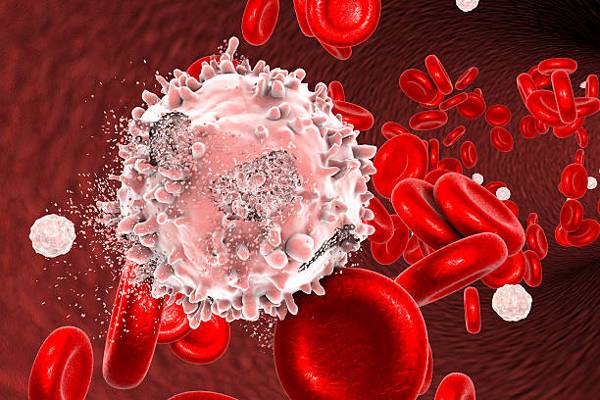
Lukemia & Lymphoma
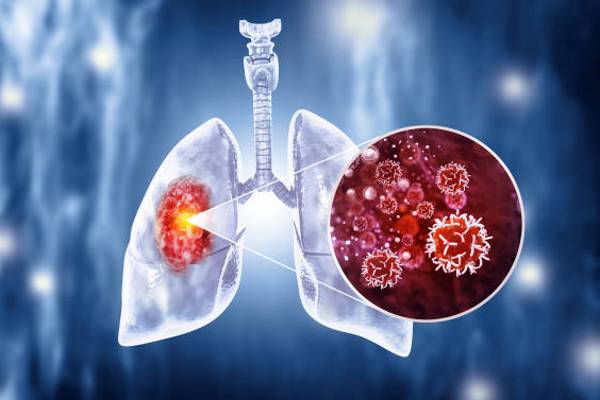
Lung Cancer
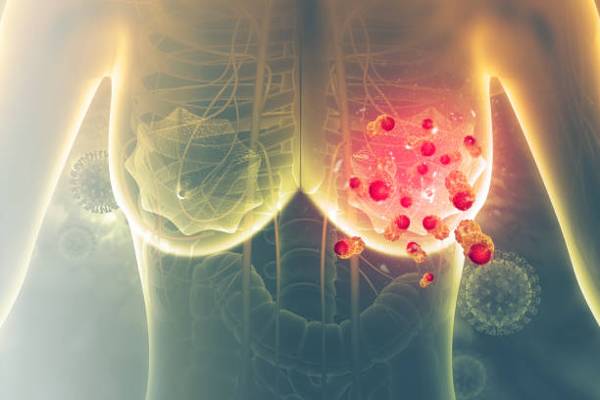
Breast Cancer
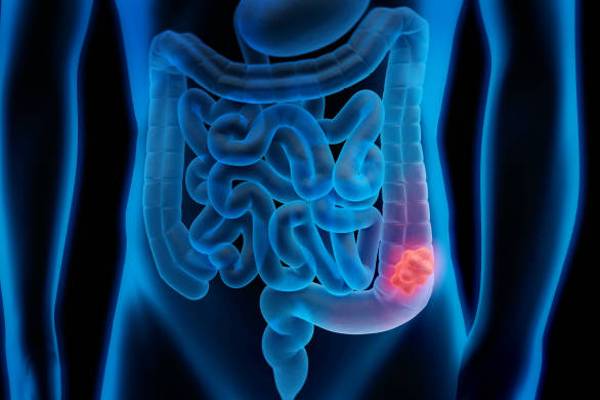
Colon Cancer

Bone & Soft tissue Sarcoma

Head & Neck Cancer

Kidney Cancer

Liver & biliary tract Cancer

Lymphoma

Ovarian & gynecological Cancer

Pancreatic Cancer

Prostate Cancer
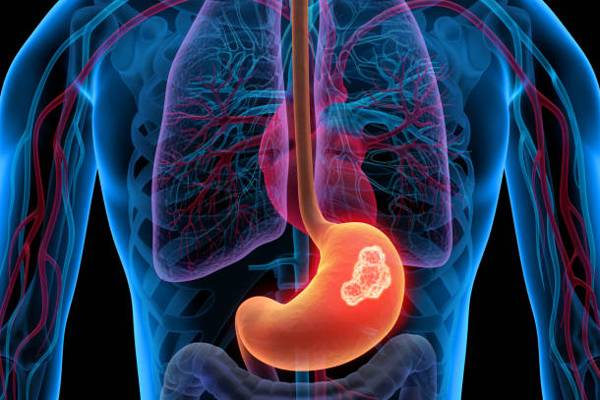
Stomach & Upper Digestive Tract Cancer
My Publications
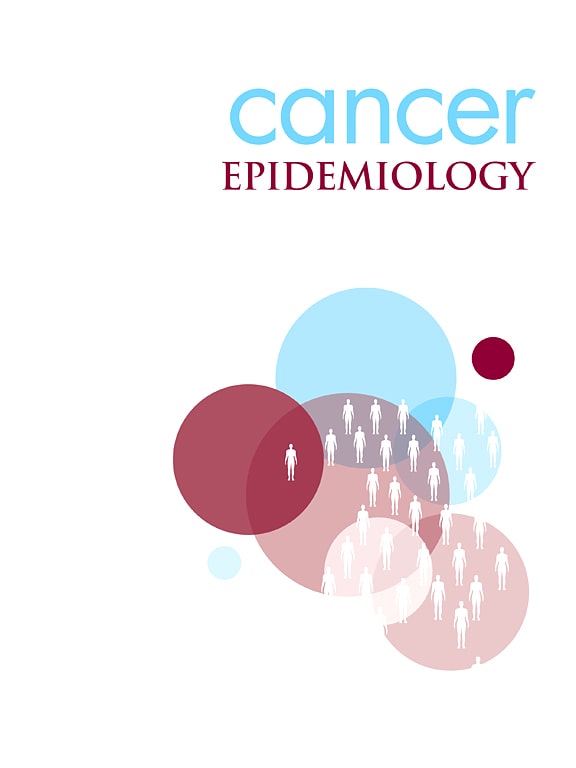
Socioeconomic and administrative factors associated with treatment delay of esophageal and gastric carcinoma: Prospective study from a tertiary care centre in a developing country.
Lokanatha D, Hassan SA, Jacob LA, Suresh Babu MC, Lokesh KN, Rudresha AH, et al
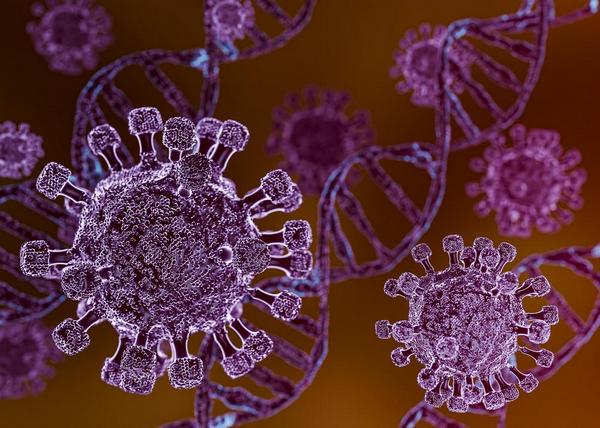
Double Philadelphia Chromosomes- A Rare, Yet an Important Cytogenetic Phenomenon of Prognostic Significance in De Novo Acute Lymphoblastic Leukemia
Siddappa, S., Hassan, S.A., Lingappa, K.B. et al
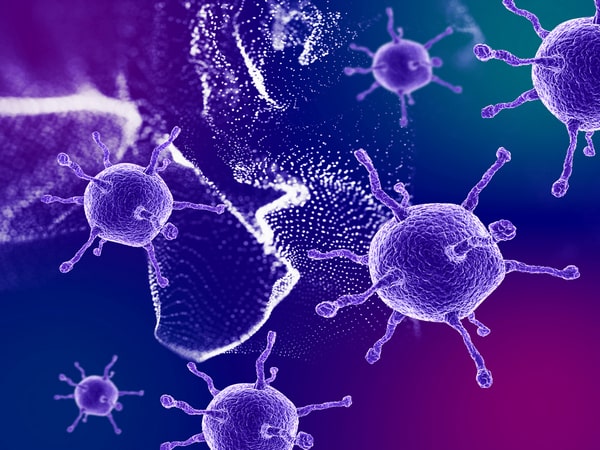
Pre-phase strategy to mitigate first cycle effect in diffuse large B cell lymphoma
Rudresha A.H., Hassan, S.A., Sreevalli, A
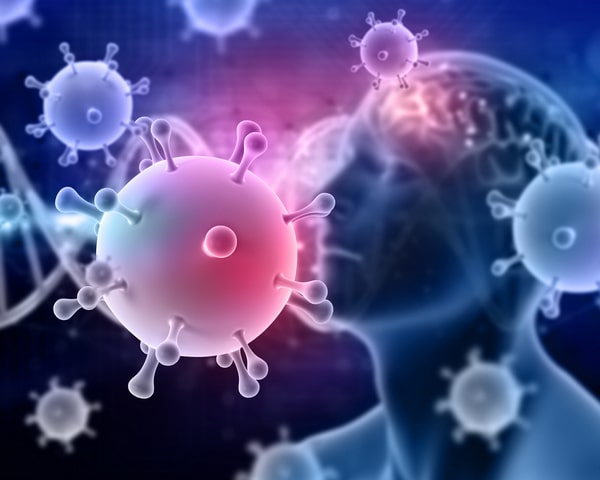
Pre-phase Primary mucinous carcinomas of the lung: Clinical characteristics and treatment outcomes.
Rajeev LK, Thottian AGF, Amirtham U, Lokanatha D, Jacob LA, Babu MCS, Lokesh KN, Rudresha AH, Saldanha S, Hassan SA.
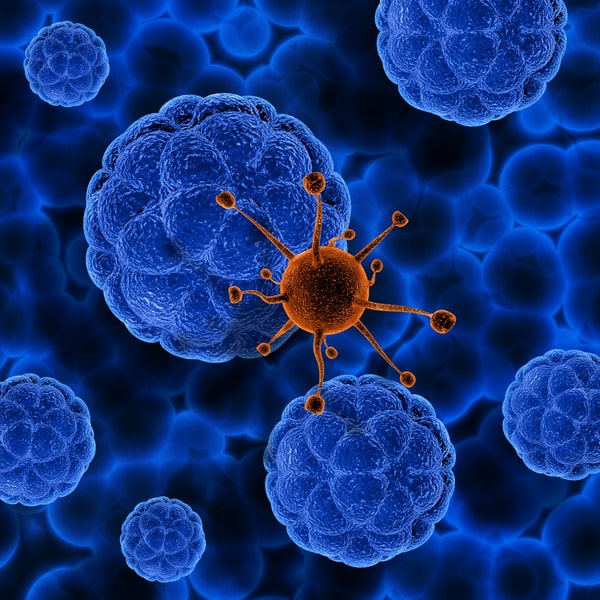
Rare case of isolated dural marginal zone lymphoma. Indian J Med Paediatr Oncol.
Babu MCS, Hassan SA, Premalata CS, Lokanatha D, Jacob LA, Lokesh NK, et al.
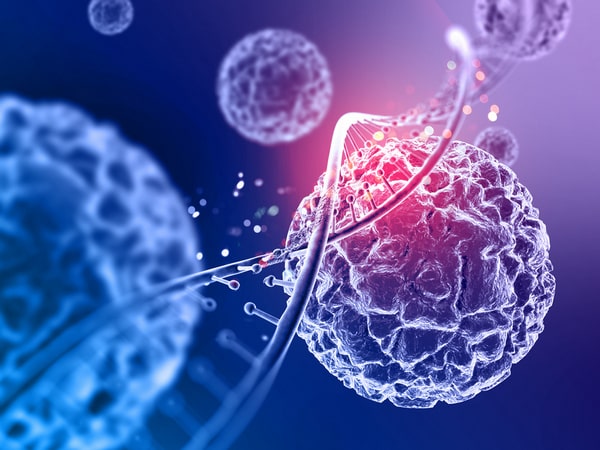
Nested stromal and epithelial tumor of the liver: An unusual nonhepatocytic entity. Indian J Med Paediatr Oncol.
Babu MCS, Sreevalli A, Hassan SA, Champaka G, Lokanatha D, Jacob LA, et al.
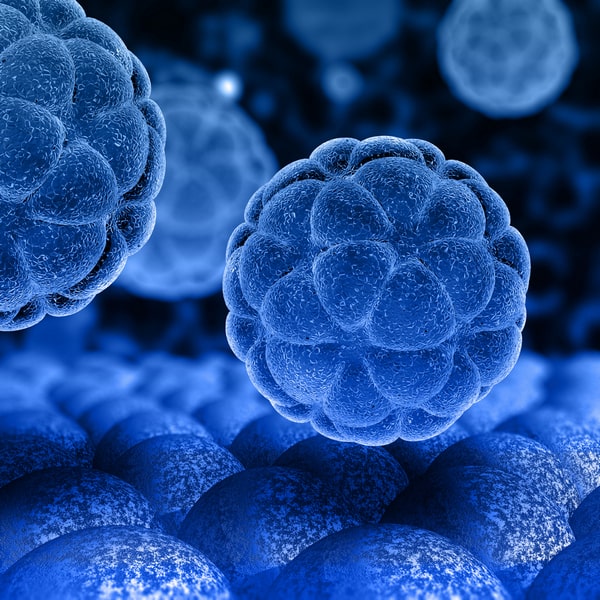
Follicular lymphoma transforming to DLBCL and reverting back to follicular lymphoma at relapse-a case report. J Egypt Natl Cancer Inst
Suresh Babu MC, Thottian AGF, Lokanatha D, Jacob LA, Lokesh KN, Rudresha AH, L K Rajeev , Saldanha Smitha , Syed Adil Hassan , Khandare Pravin Ashok , C S Premalatha , M N Suma
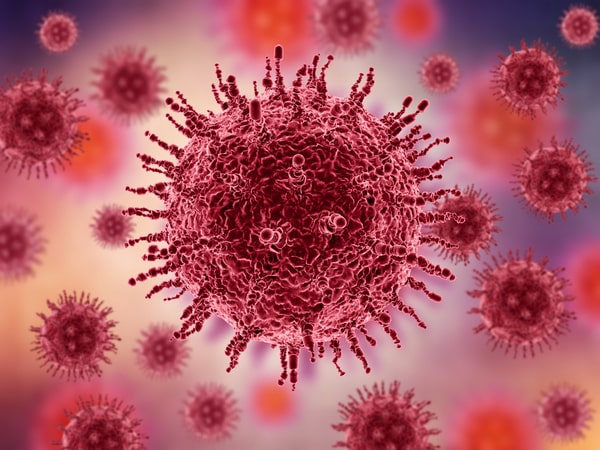
Posterior reversible encephalopathy syndrome in childhood Takayasu's arteritis with probable association with tuberculosis assam journal of internal medicine
S Islam, R Barman, A J Talukdar, S Dutta S, S A Hassan
What client says about?
We met the doctor three months ago and from then till now he has been a boon to us. He has guided us all the way to lead a better life. He is striving hard to get a medicine which is not available in India, he has been following up with multiple pharma companies multiple times to get this work done. He has stayed late nights to submit requests on the same. He has taken it as responsible, accountable of the patient and what more can we expect from any doctor. We would like to heart fullt thank you for helping us out in all directions sir. We would like to see you visiting out home once.
Anonymous
As I reflect on my journey through chemotherapy, I am filled with immense gratitude for your unwavering support, compassion, and expertise. Your dedication to my well-being went beyond medical treatment; you became a pillar of hope and strength during one of the most challenging times of my life. Your positive energy and cheerful demeanor never failed to lift my spirits, even on the toughest days. Your ability to understand my unspoken fears and concerns simply by looking at my face was truly remarkable. It was as if you possessed a special kind of intuition that provided me with the comfort and reassurance I needed to keep going. Your motivation and encouragement played a pivotal role in helping me navigate through the ups and downs of treatment. Knowing that you were by my side every step of the way gave me the courage to face each session with determination and resilience. I am deeply grateful for your unwavering support, which gave me the strength to persevere even when the journey seemed daunting. Thanks to your exceptional care and guidance, I have emerged stronger and more resilient than I ever thought possible. You have not only helped me fight against the disease but have also inspired me to embrace life with courage and gratitude. Words cannot adequately express my appreciation for everything you have done for me. Please know that your kindness and compassion will always hold a special place in my heart. You are not just a Doctor to me; you are a true hero and a source of inspiration.
MRS R***A, Breast cancer survivor ,Bengaluru
Want to Consult?
Address: Apollo Excelcare Hospital,
NH-37, near Ganesh Mandir, Paschim Boragaon, Guwahati, Assam 781033
Phone: 0361-714 0101
Email: adilhassan55@gmail.com
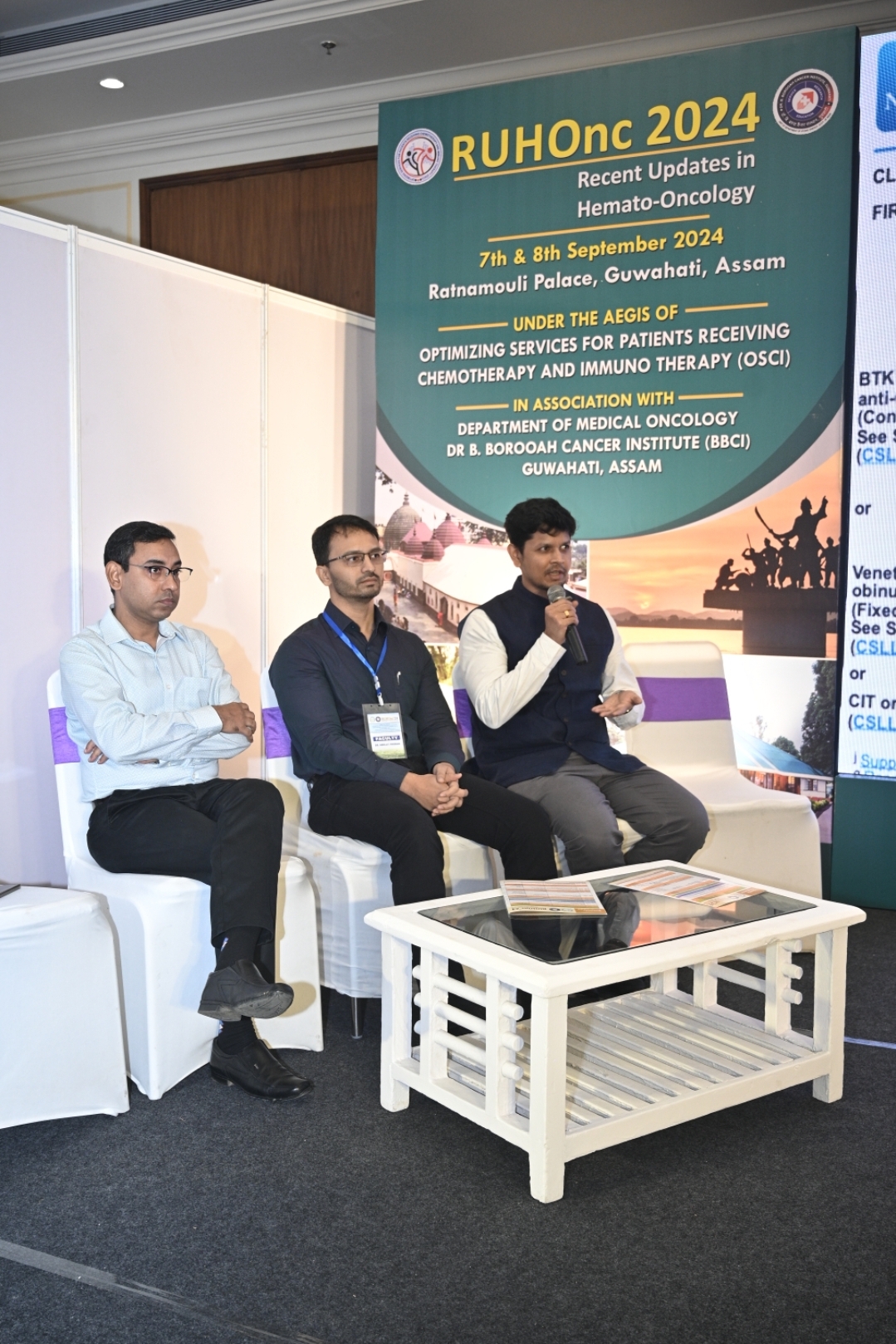
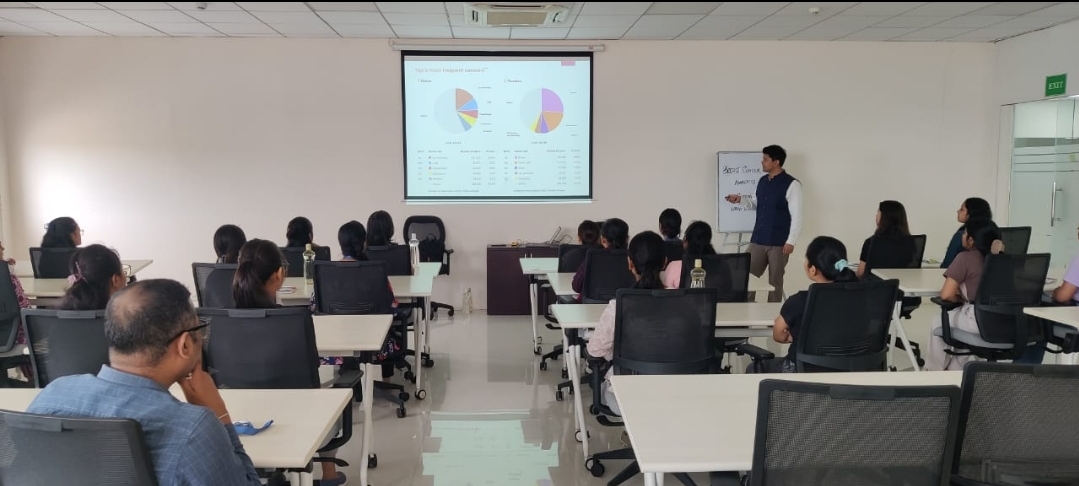
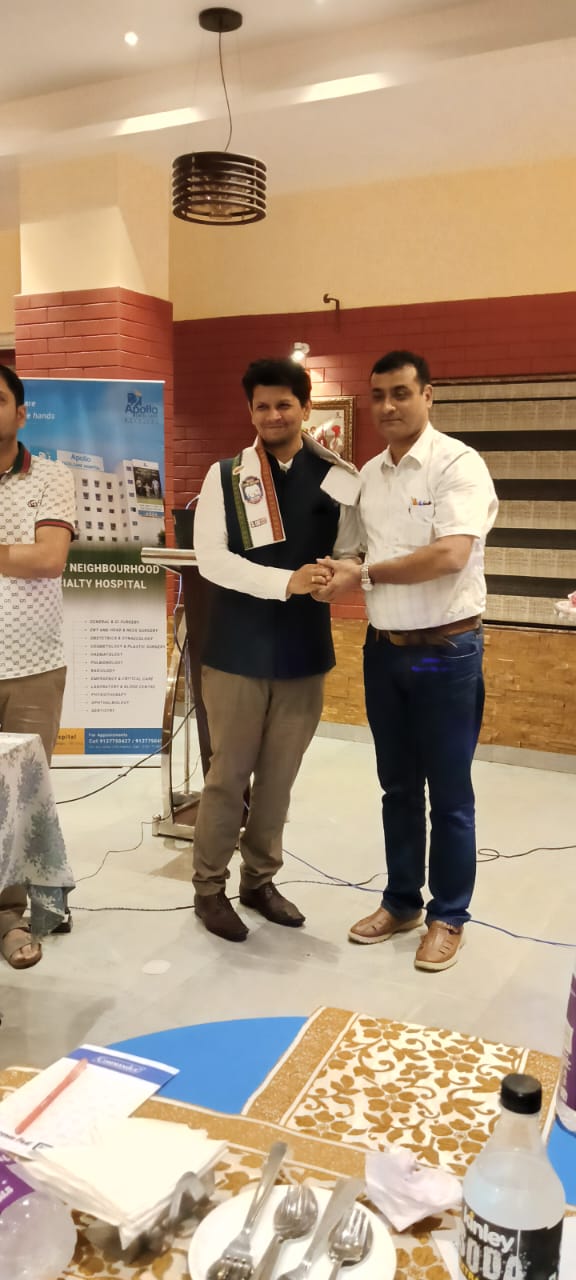
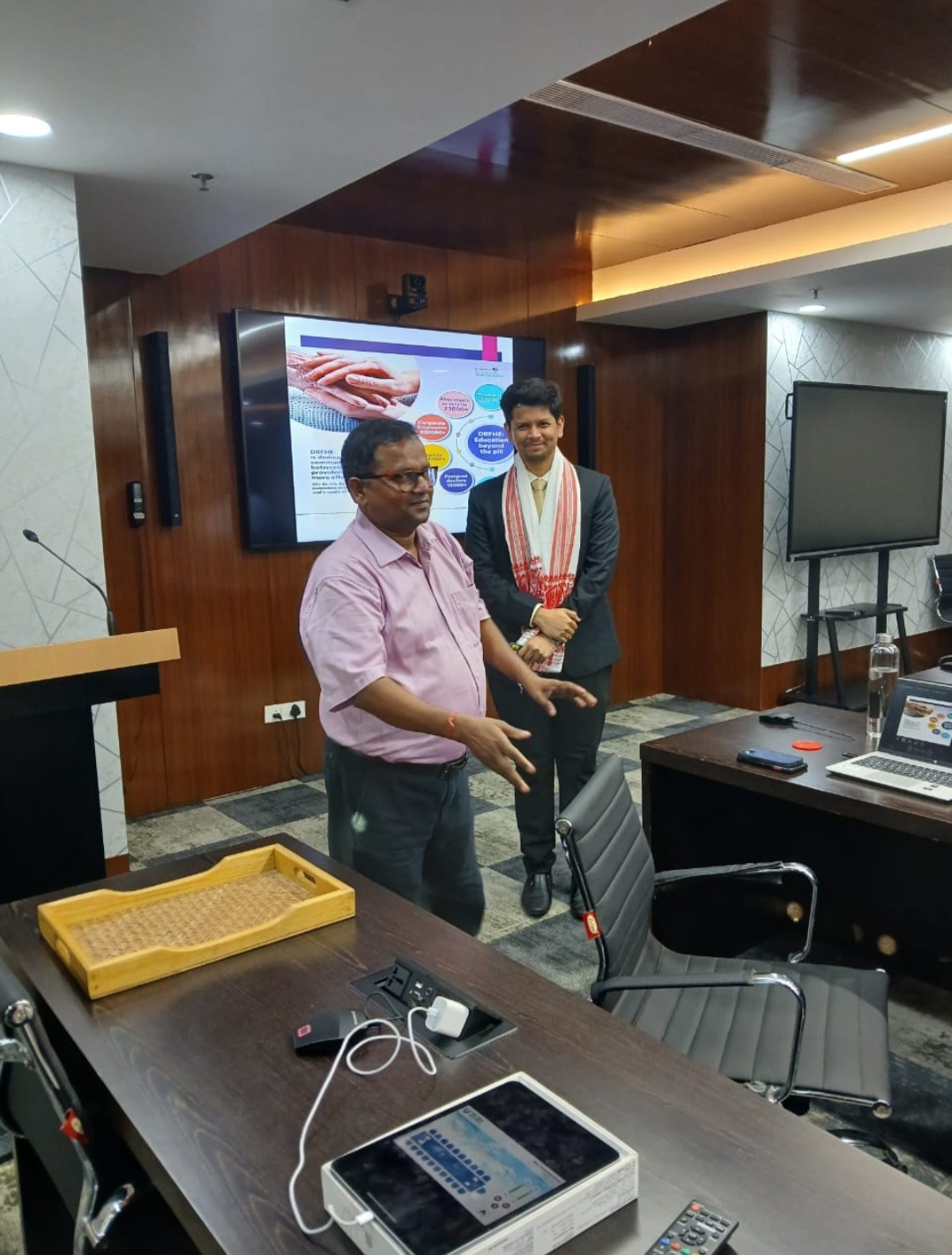
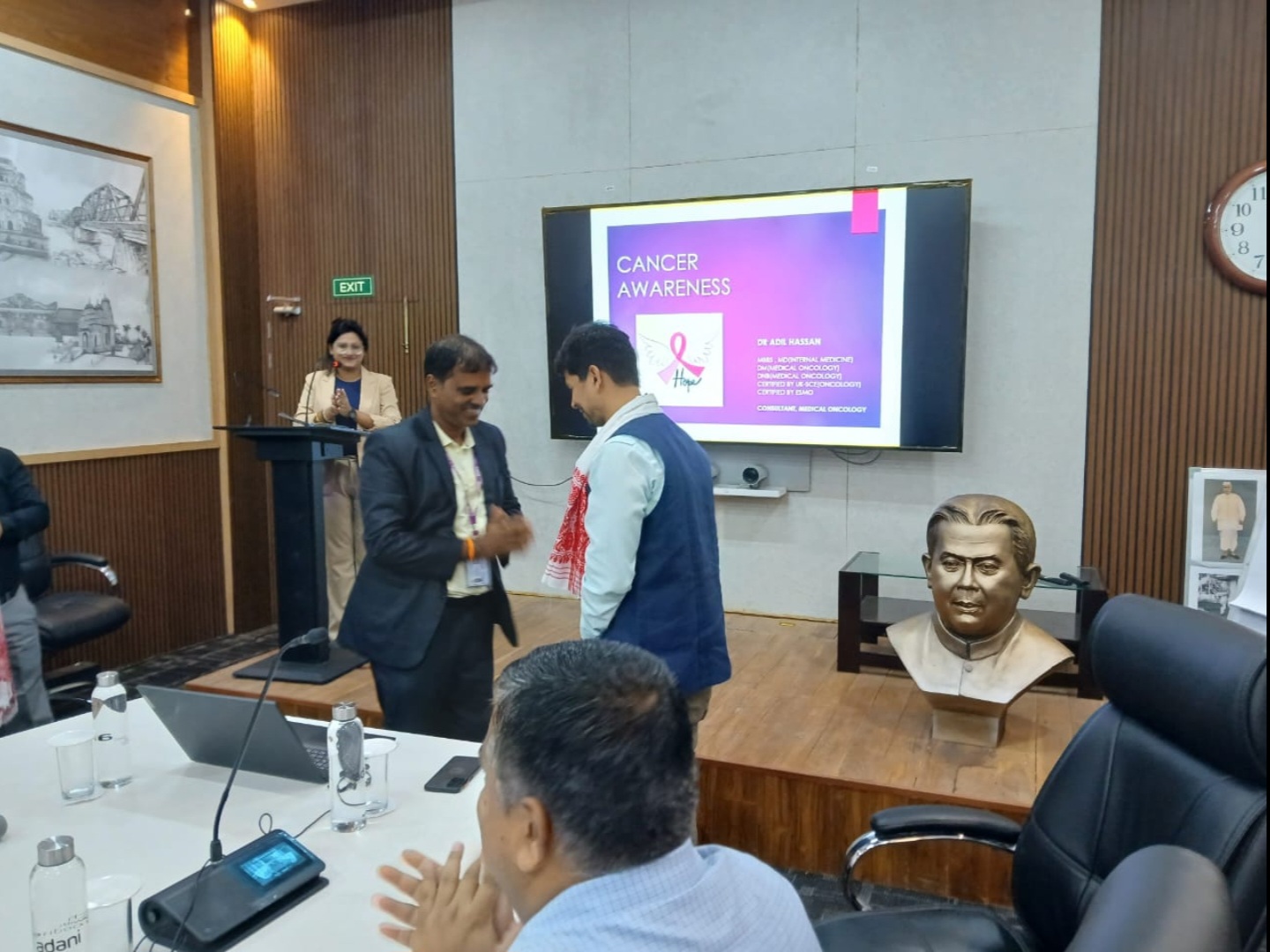

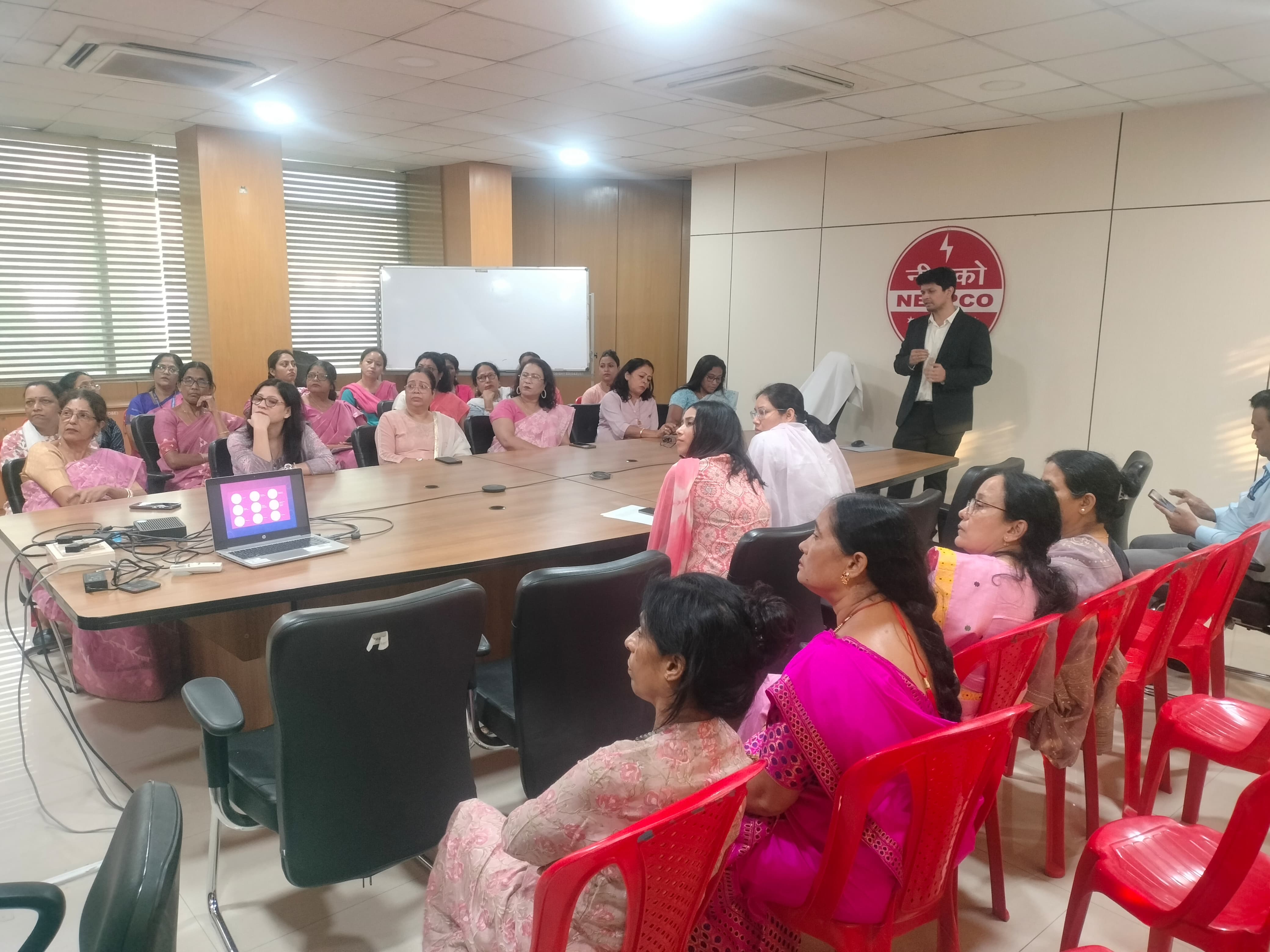
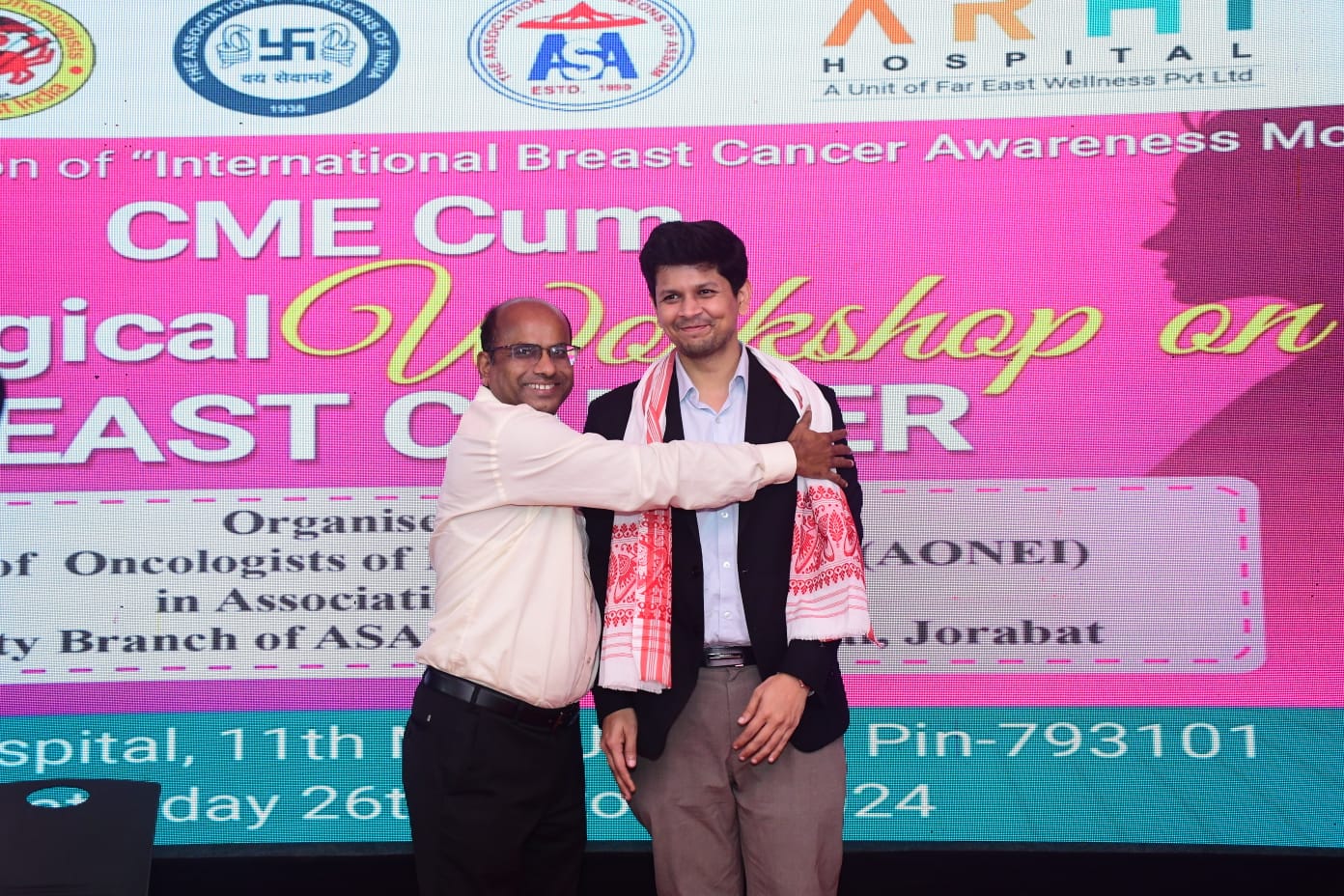



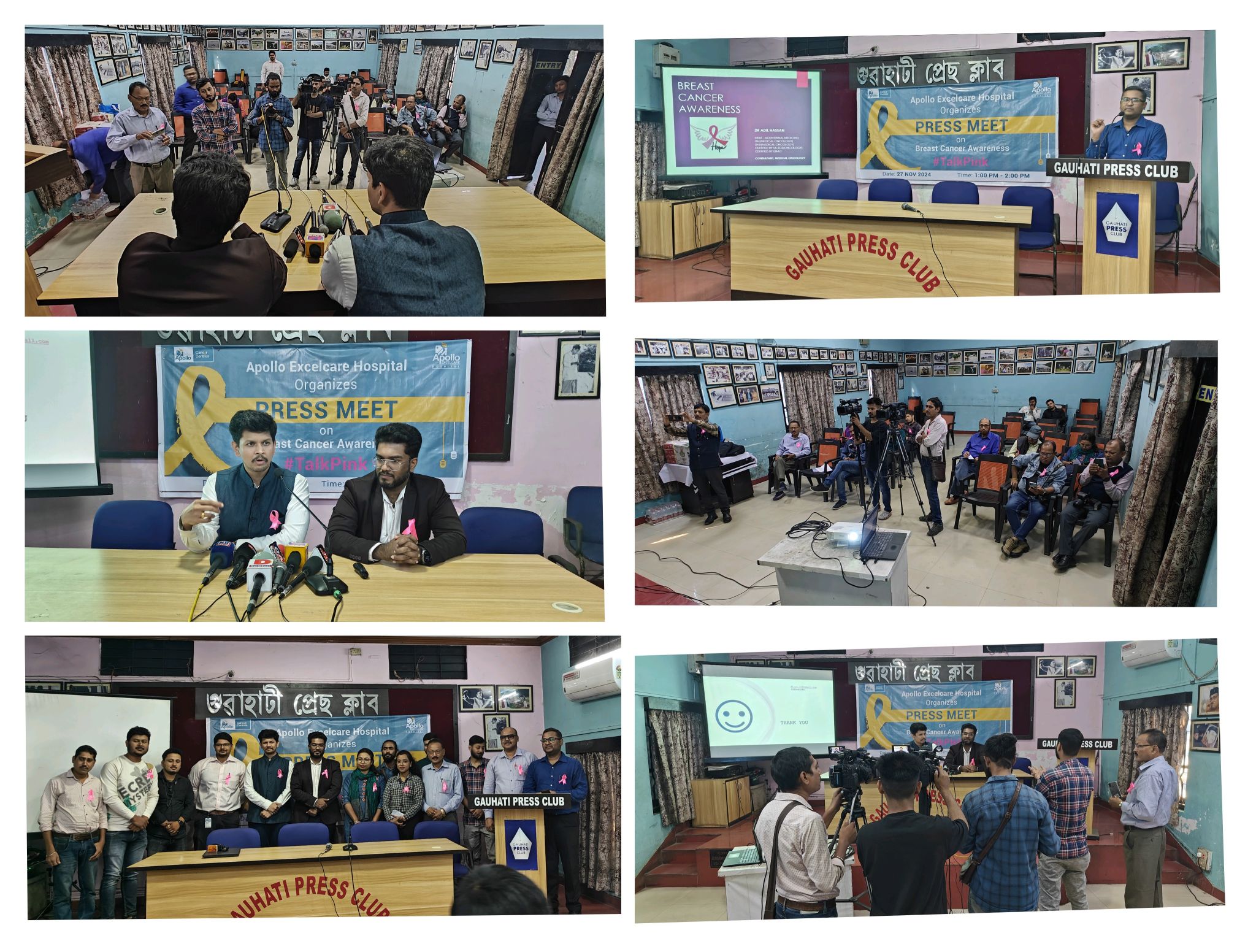
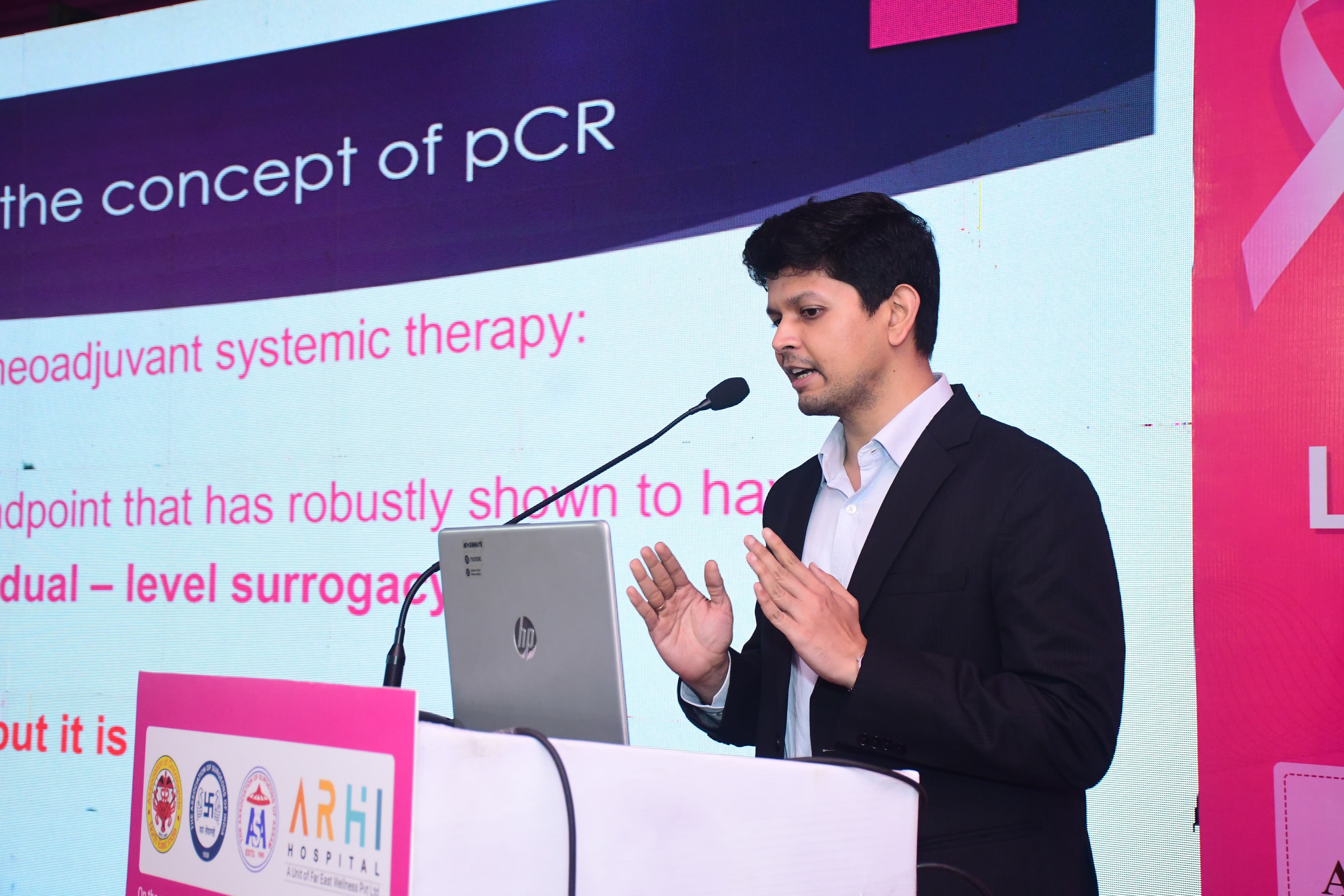
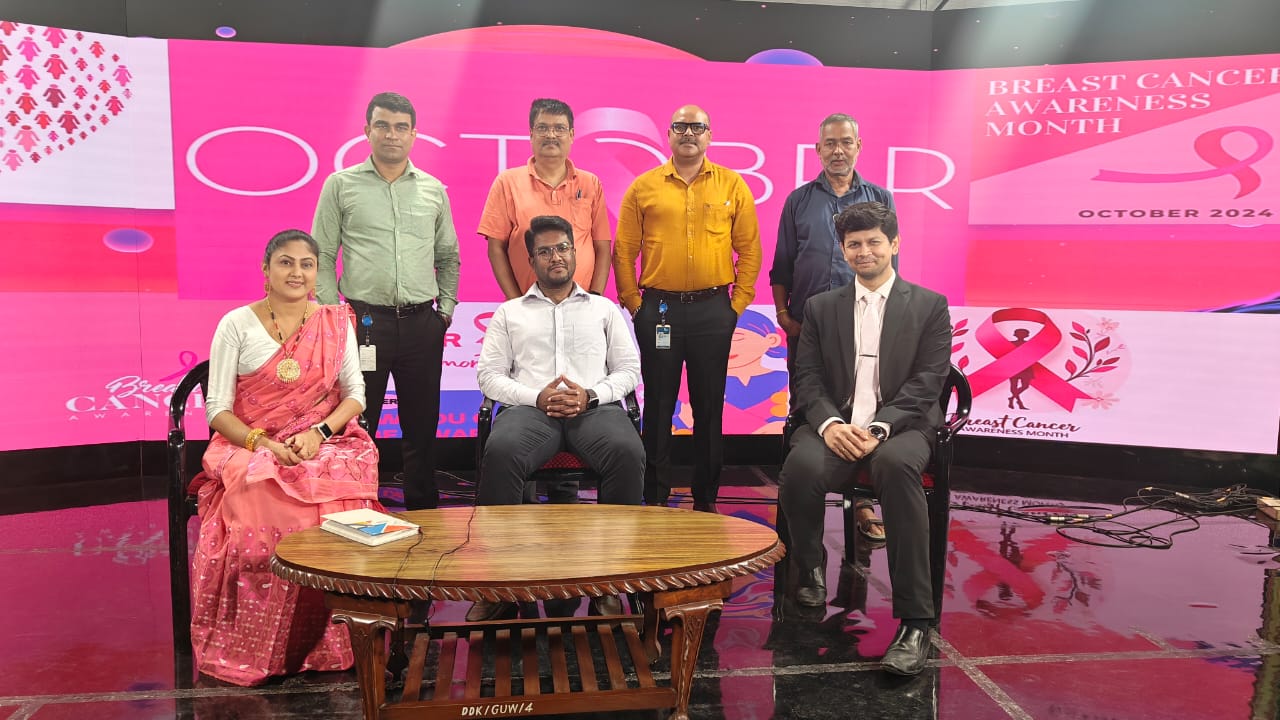
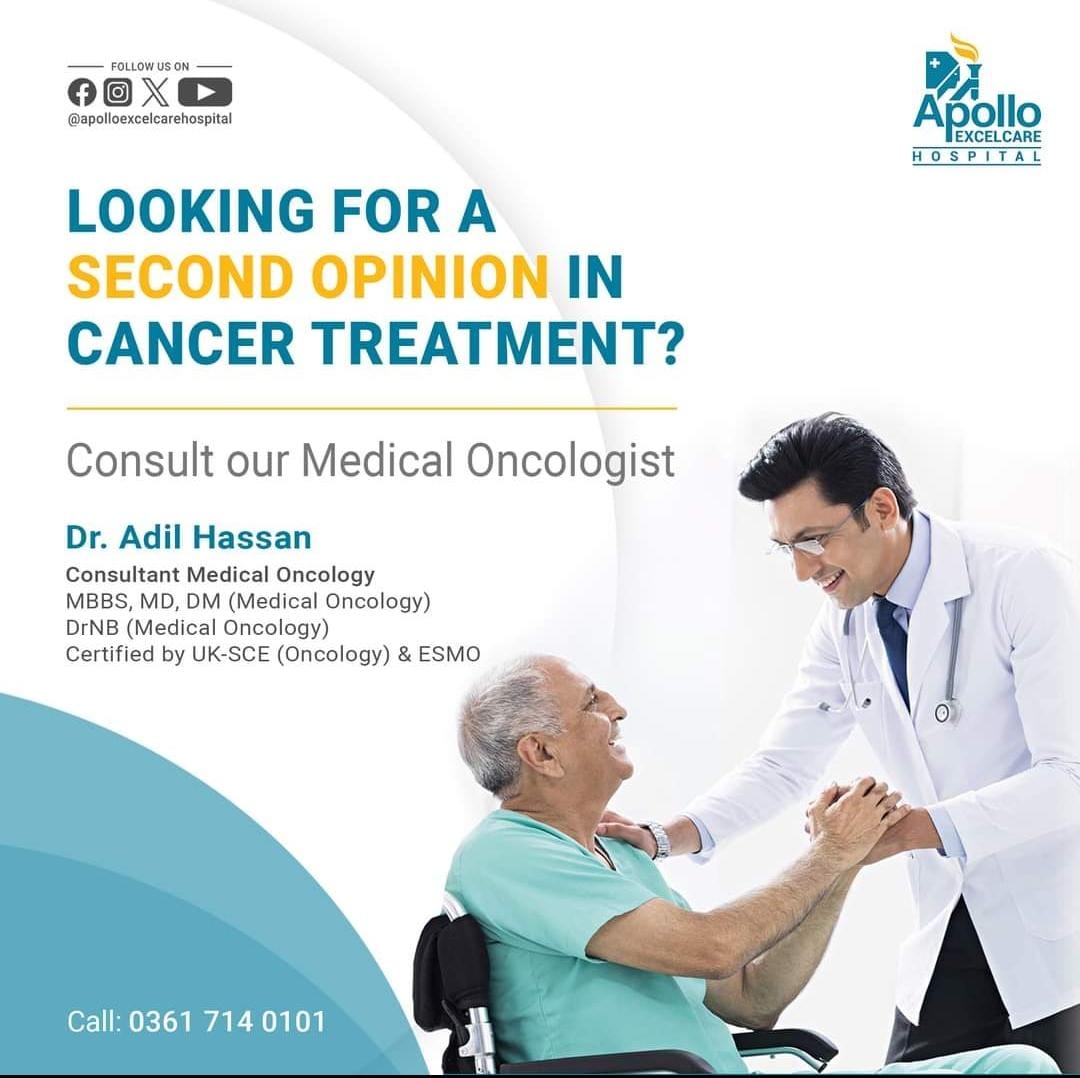
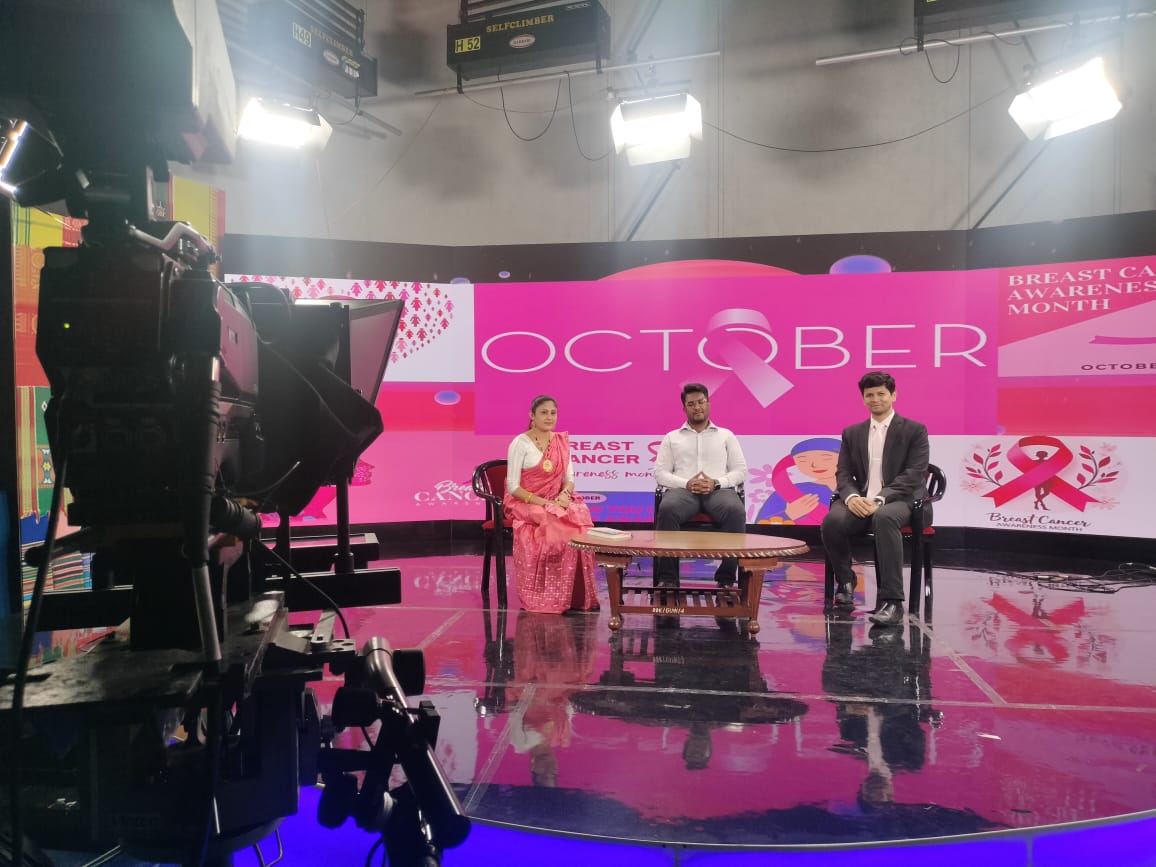
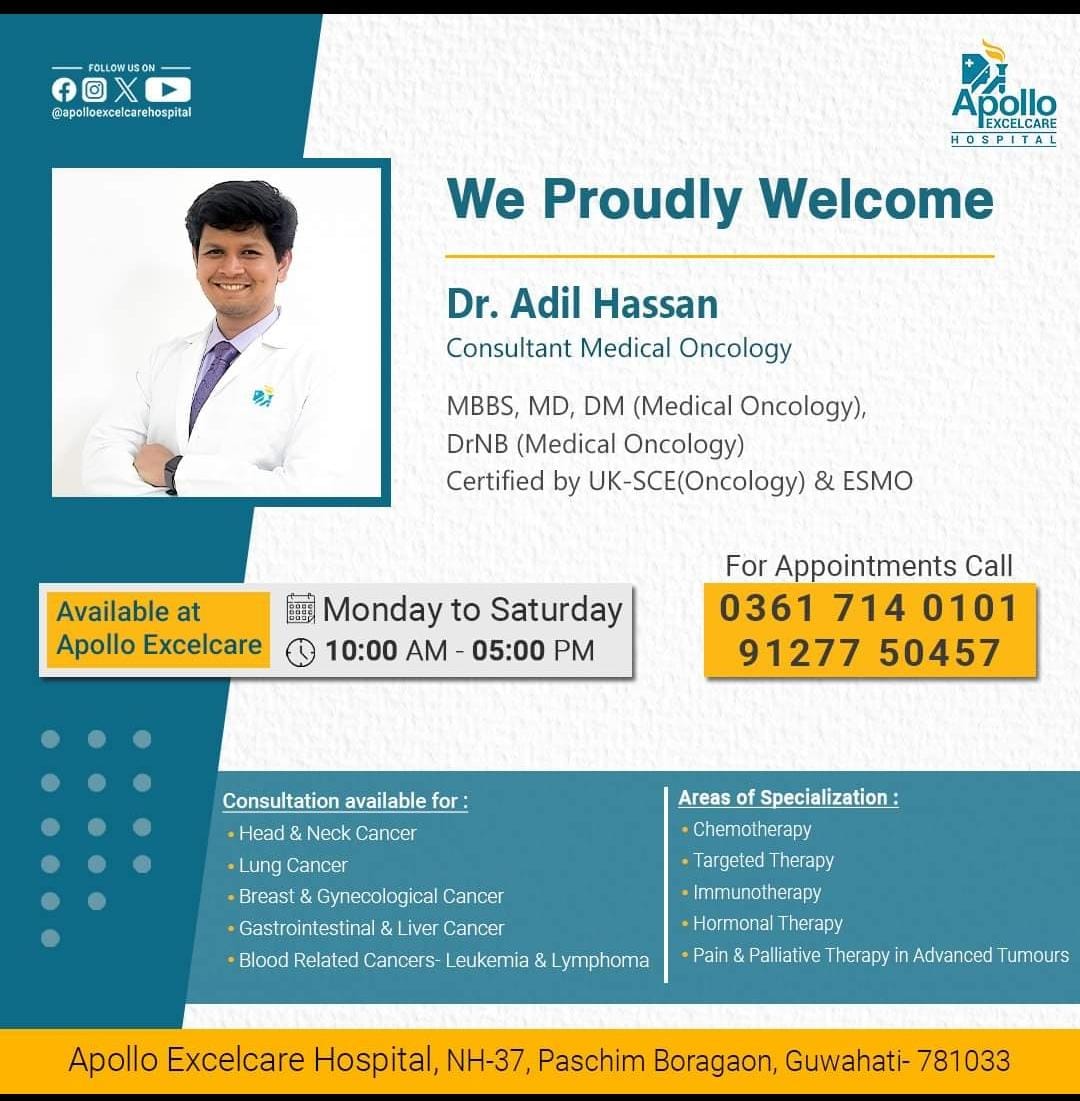
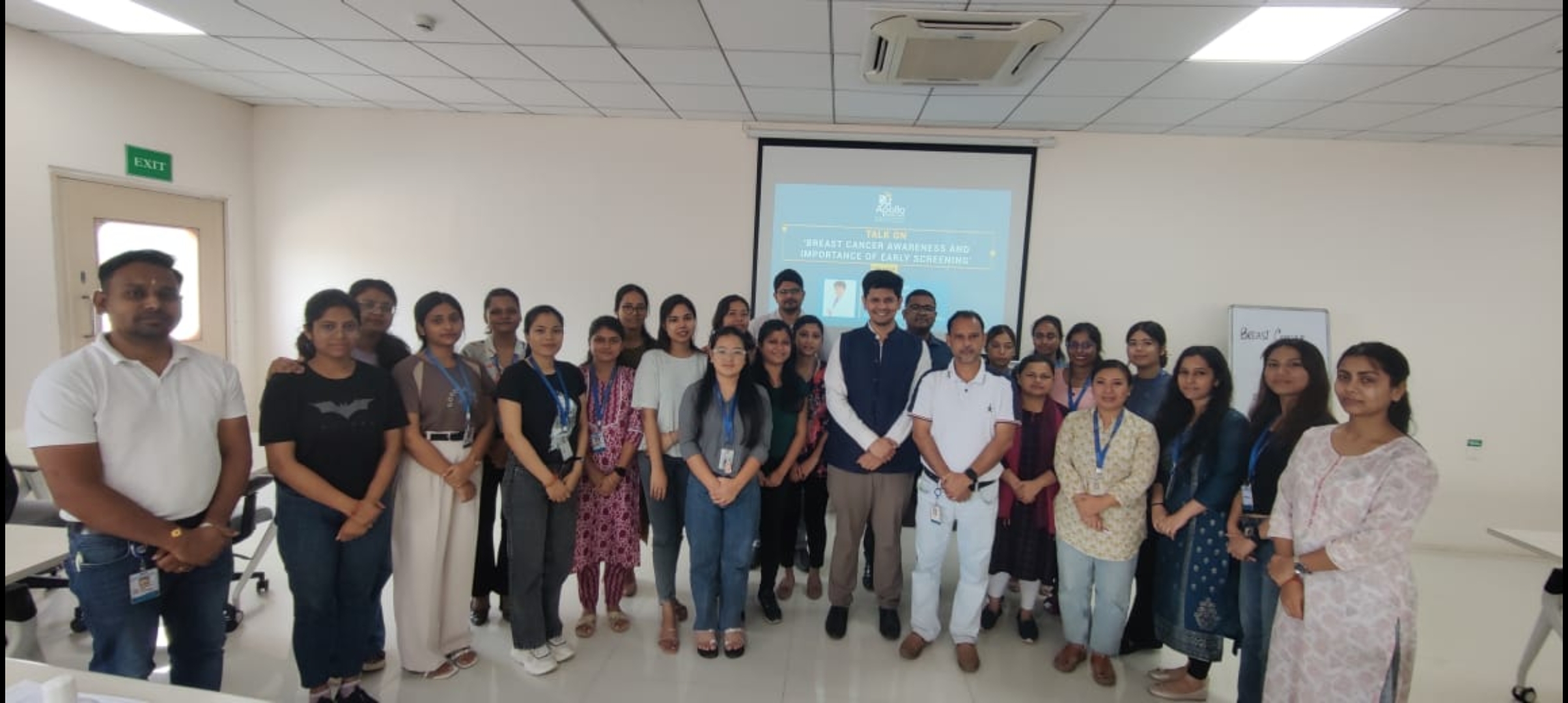
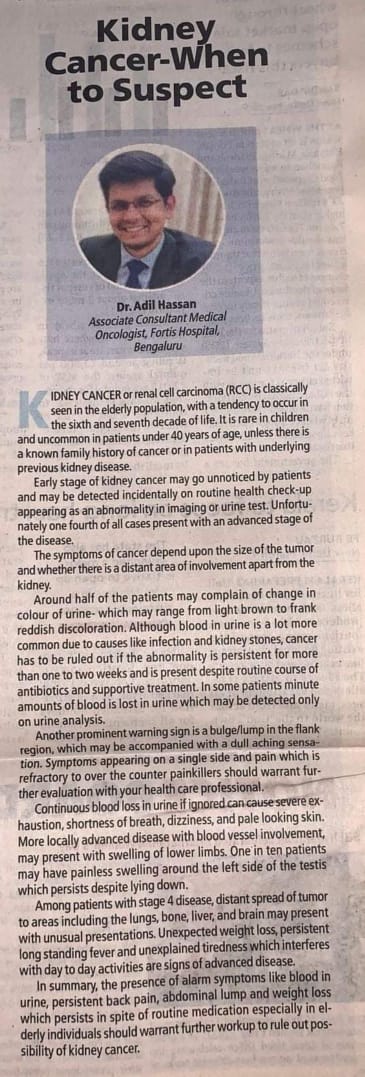
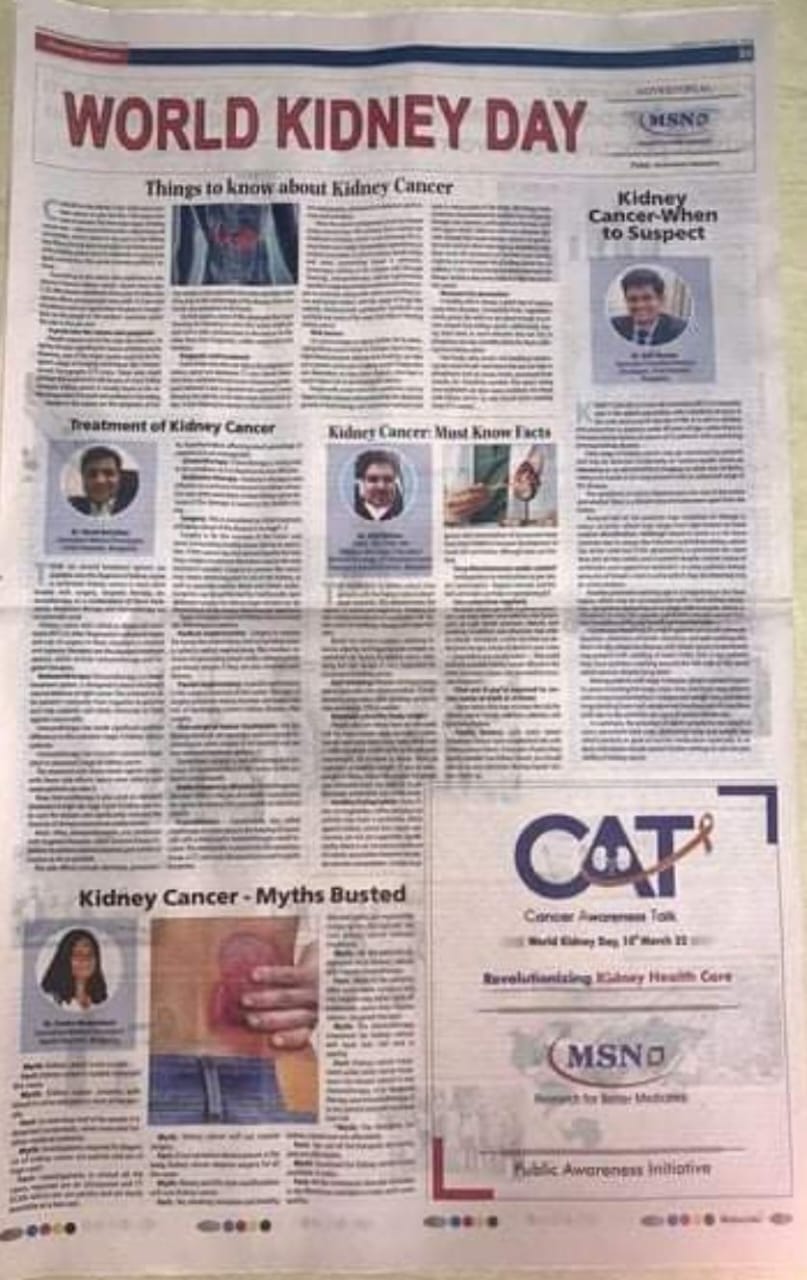
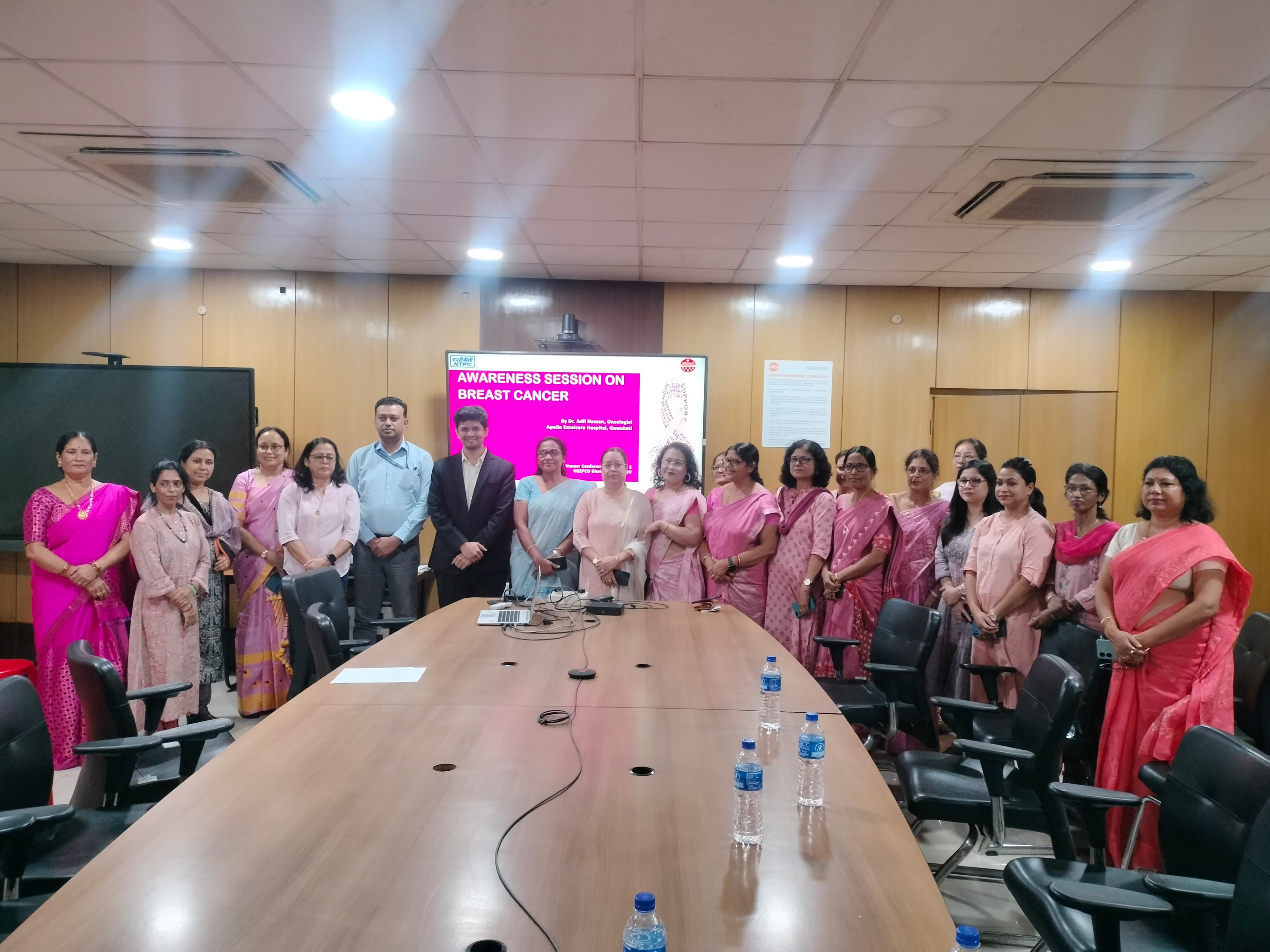
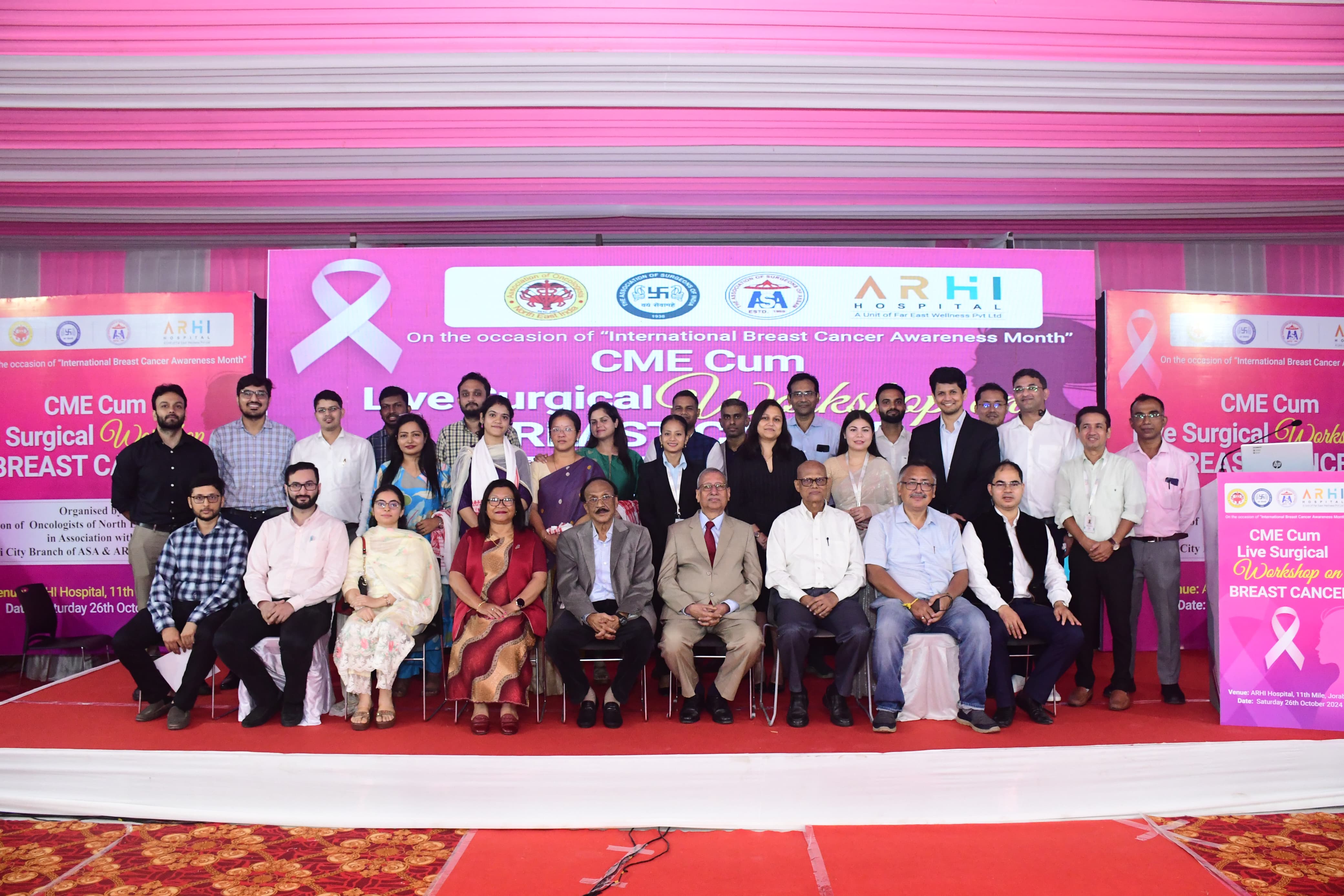
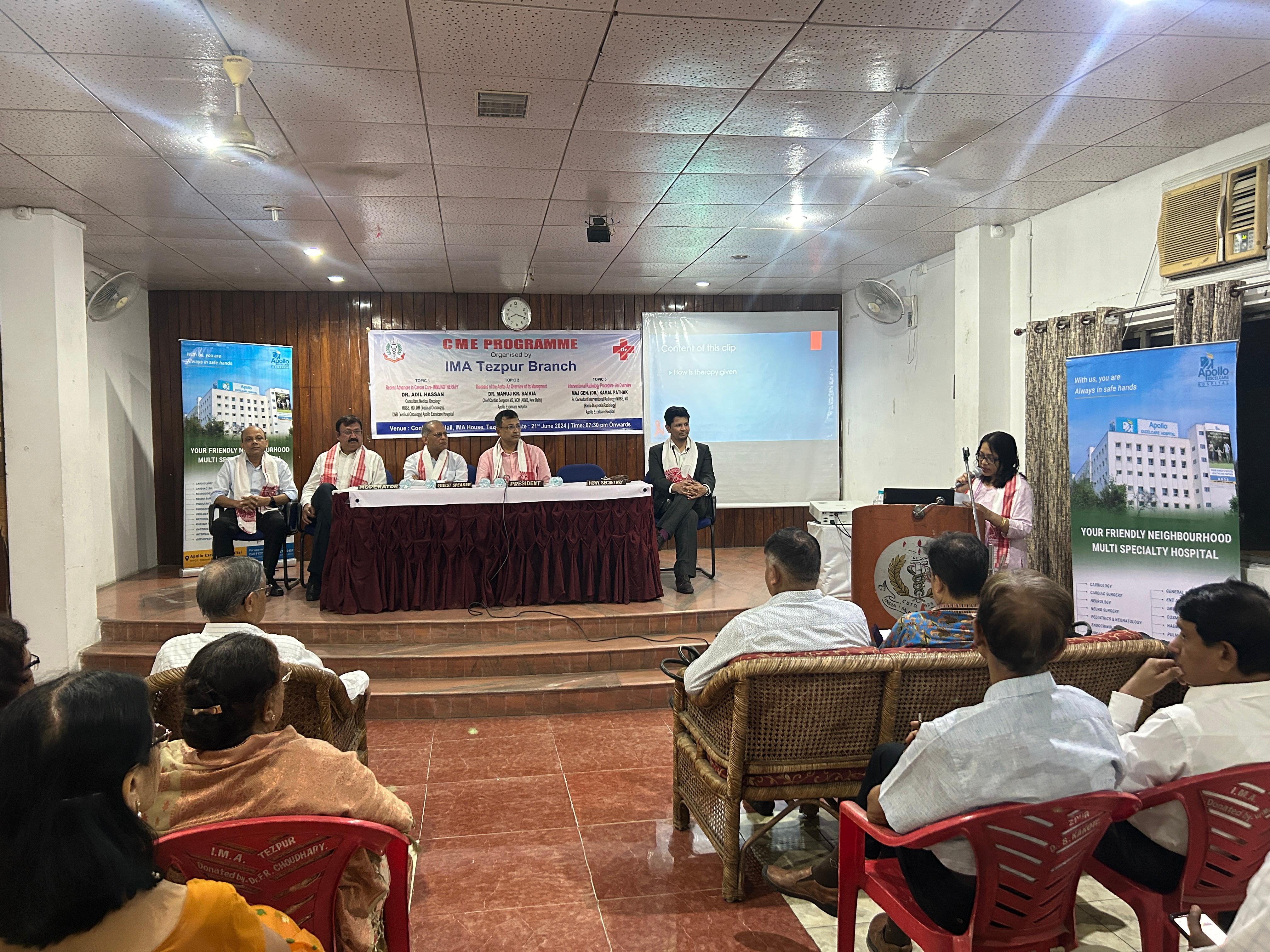

Twitter
Instagram
Facebook